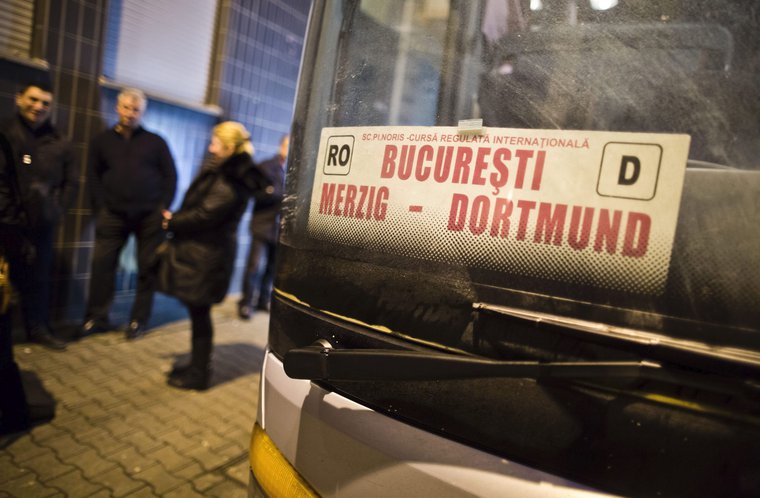Immigration within the EU is held up as the non plus ultra of freedom of movement within the union. No one likes to talk of about the inequalities and hardship, which lies behind this system of cheap labour for Western Europe.
Magda Ulceluse is a postdoctoral researcher at the University of Groningen, researching the link between migration and inequality within Europe, and managing the Migration and Inequality dimension of the IMAJINE H2020 project. She has worked on projects for organisations including the European Commission, the International Labor Organization and ESPON.
Cross-posted from Open Democracy

Has the corona crisis changed perceptions of emigration for good in Romania? There are reasons to think so. The knee-jerk reactions to Romanians returning home during the pandemic were not only caused by fear. Rather, they reflect broader processes of social distancing, set in motion long before the virus appeared on the scene.
In mid-February, when the northern part of Italy went into lockdown because of the Corona virus, many Romanians packed up their bags and returned home. Between February 23 and March 10, an estimated 34,000 Romanians entered the country, returning from Italy, Spain, Germany or the Netherlands. The first to return were those most vulnerable, working in restaurants, the construction sector or in homecare, who had lost their jobs, run out of money, and were driven out by their employers and landlords, or returned by local governments.
They were the lucky ones, the ones still able to travel to Romania, in times where many others were stuck in remote areas where they lived and worked. In this desperate situation, they left for what they still considered home, in search of shelter, companionship and love. They did not expect what they received.
Worried that the returnees, many of whom were coming from the heavily affected Lombardy region in Italy, were going to spread the virus in Romania, the government closed the borders, leaving thousands waiting in the cold for information and processing, chanting “we too are Romanians” and “we want to go home”.
Those arriving by plane were going through similar conditions, having to wait for hours in confined spaces with hundreds of other returnees, being assailed with questions such as “why did you have to return?” when they asked for information about what was going to happen. When they finally managed to get home, they were shunned by the local population, who viewed them as harbingers of the virus. In Suceava, the city hardest hit by the virus in the country, locals were accusing returnees of bringing in the virus and “finishing off the city”. The mayor and the vice-mayor of the city blamed the rapid expansion of the virus in the city on the returnees who did not respect their quarantining conditions and walked around the city unprotected. Facebook was full of messages reprimanding emigrants for returning and accusing them of bringing the virus to “our country”.
Some reported on their neighbours, who returned from Italy, others proceeded to isolate their own family members, for fear of being infected with the virus. They were no longer those bringing sweets and jewellery and perfumes and goods from abroad, now they were the ones bringing in the virus. This behaviour, from the government down to the neighbourhood and family unit, was not only the result of fear. Rather, the crisis brought into sharp relief the growing social cleavages between migrants and those staying behind in Romania.
Between 2008 and 2018, an estimated 2.4 million Romanians emigrated to other European countries, according to Eurostat figures. This significant outflow was not without consequences. My research, conducted within the IMAJINE project, exposes the reverberating effects of emigration in Romania, affecting the life of individuals and communities.
On the one hand, emigration from Romania has contributed to easing the pressure on unemployment and the demand for social benefits, as many families would have otherwise needed social support. Through remittances, many families left behind experienced an increase in their standard of living, being able to spend more on consumption, education and health.
On the other hand, the material gains from migration were unevenly distributed, with non-migrant families often feeling an increasing wealth gap between themselves and migrant families. Increasing inequality within the community was accompanied by the emotional distress inflicted on children and the elderly left behind, for many of whom, the material benefits derived from migration did not always offset the emotional costs. The physical distance often translated into an emotional one, with significant changes in the dynamic of relationships within the family and within the community. Cases of divorce, cooled off relationships between siblings, or the inability to speak to one’s nephews because they do not speak Romanian, are just some of the individual social effects of emigration. The departure of many people affected the social cohesion within communities, too. Because they were no longer physically present, nurturing relationships, migrants were no longer perceived as being a part of the community. Moreover, upon return, many were perceived to have become more materialistic, less willing to lend a helping hand, having acquired “Western” attitudes of individualism, which further entrenched the difference between those staying and those migrating.
The reactions to their return, particularly in a time of crisis, only tore open a crevice that has been slowly growing for years. There is no longer a unified US in Romania; now it’s an US vs THEM.


Be the first to comment